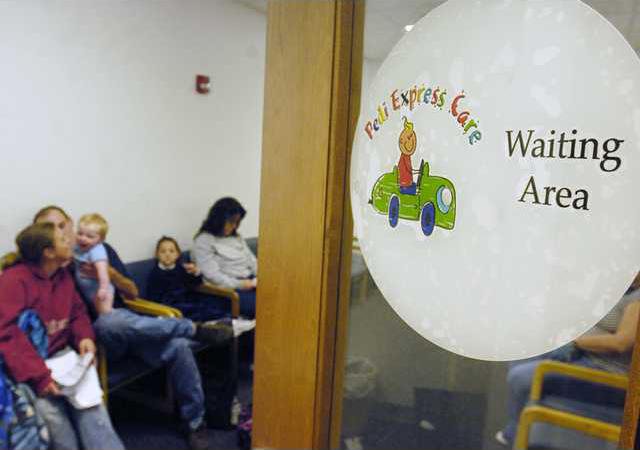1103expressaud
Dr. Stephen Klacik of the Longstreet Clinic talks about Pedi Express Care.Contact
Longstreet Clinic’s Center for Pediatrics, 770-535-3611
Healthy Monday
Every Monday The Times looks at topics affecting your health.
If you have a topic or issue you would like to see covered in our weekly series, contact health reporter Debbie Gilbert at dgilbert@gainesvilletimes.com or 770-718-3407.
If all you’re buying is a gallon of milk, you don’t want to stand in the checkout line behind someone who has a full shopping cart.
That’s why most stores provide an "express lane" for customers who need to get in and out quickly. Now, the same concept is coming to health care.
About a month ago, the Longstreet Clinic’s Center for Pediatrics began offering Pedi Express Care, a program that separates patients with simple illnesses from those who need a more extensive visit.
Pediatrics administrator Pam Patterson said the program is an attempt to find a balance between two categories of patients: those who are sick versus those who are there for routine visits, such as school physicals.
"We never turn any child away," she said. "If they’re sick, we see them that day."
But no matter how many sick kids show up, the clinic doesn’t cancel patients who already have routine appointments. And that can create a backlog, with wait times of up to an hour.
Under the new system, each day a different Longstreet pediatrician is assigned to handle the Express Care patients. If parents prefer, they can always see the child’s regular doctor, though they may have to wait longer.
Express Care has its own waiting area and check-in/check-out station. Patterson said the typical wait for Express Care is less than half an hour, usually averaging 10 to 15 minutes.
"The reaction I’ve heard (from parents) is very positive," she said. "They’re in and out."
The doctors like it, too, because it’s also cut down on wait times for routine visits.
"Express Care has helped the other providers to stay on schedule," said Patterson.
But not every child qualifies for the express service. Patients must be at least 2 years old, and they must have a straightforward illness with just one primary symptom.
"We made a little booklet (of eligible diagnoses)," said Dr. Stephen Klacik, a Longstreet pediatrician.
Examples include strep throat, ear infections, pink eye, stitch removal, minor rashes and sunburns, and uncomplicated colds.
Sometimes, the parents are just looking for a quick diagnosis and a little reassurance, Klacik said. "A good example is the mom who has a kindergartner with a sore throat, and she needs to find out if it’s strep so she knows whether or not she can send the child to school," he said. "She shouldn’t have to wait for an hour just to know that, when a simple exam and rapid strep test could answer the question."
In other cases, it’s obvious what’s wrong. The child may have had five previous ear infections, and now they’ve got the same familiar symptoms.
"A lot of times, (parents) know what it is and just need a prescription so they can start treating it," Klacik said.
In the old days, doctors often would talk to a parent on the phone and then call in a prescription to the pharmacy. But now, the standard of care is to always examine the patient before prescribing medicine.
That can be frustrating to parents whose kids are frequently sick. Every time the child gets a cough or an earache, they have to take time out of their schedule to sit in a waiting room.
Klacik said the clinic works with parents in advance to determine whether their child’s illness is appropriate for Express Care.
"We’ve created some guidelines for our triage nurses, who ask a set of questions so they can make a decision over the phone," he said.
Occasionally the Express Care doctor will examine a patient and realize the illness is more complicated than first thought.
"If it turns out to be more serious, we can move that patient out of the express flow, and they would be treated by a doctor who has more time," he said.
Patterson said they don’t put patients in Express Care if the illness requires lab work, because having blood drawn or collecting a urine specimen can be time-consuming.
"We also don’t allow people in Express Care if they have more than one child who is ill," she said.
Patterson said the Longstreet pediatrics location in Gainesville has 29 exam rooms. One is reserved for emergencies, one for immunizations. Four of the remaining 27 now have been designated for Express Care.
Patterson said the new system is working well so far, but it hasn’t yet faced the real test.
"We wanted to have Express Care in place before the ‘sick season,’ when we see a lot of flu-type illnesses," she said. "That usually starts in early November."

